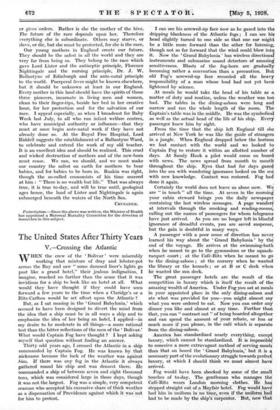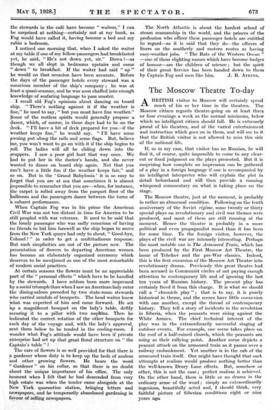W HEN the crew of the ' Bolivar ' were miserably
working that mixture of dray and lobster-pot across the Bay and saw " some damned liner's light's go past like a grand hotel," their jealous indignation, I imagine, reached no further than the sense that it was invidious for a ship to look like an hotel at all. What would they have thought if they could have seen forward a few years to the time when a Claridge's or a Ritz-Carlton would be set afloat upon the Atlantic ?
But, as I sat musing in the ' Grand Babylonia,' which seemed to have been designed to divert the mind from the idea that a ship must be in all ways a ship and to emphasize the idea of her being an hotel, I applied—in my desire to be moderate in all things—a more rational test than the bitter reflections of the men of the ' Bolivar.' What would Captain Fog have thought ? I'kept asking myself that question without finding an answer.
Thirty odd years ago, I crossed the Atlantic in a ship commanded by Captain Fog. He was known by that nickname because the luck of the weather was against him. If there was any fog in the Atlantic it always gathered round his ship and was densest there. He commanded a ship of between seven and eight thousand tons, which was considered large in those days, though it was not the largest. Fog was a simple, very competent seaman who accepted his excessive share of thick weather as a dispensation of Providence against which it was not for him to protest. I can see his screwed-Up face now as he gazed into the dripping blankness of the Atlantic fogs ; I can see his head slightly turned to one side so that one ear might be a little more forward than the other for listening, though not so far forward that the wind could, blow into it. Now the ' Grand Babylonia ' has wireless directional instruments and submarine sound detectors of amazing sensitiveness. Blasts of the fog-horn are gradually becoming rather a convention than a precaution. But old Fog's screwed-up face recorded all the heavy responsibility of a man whose load had not yet beeil lightened by science.
At meals he would take the head of his table as a matter of duty and routine, unless the weather was 1°6 bad. The tables in the dining-saloon were long and narrow and ran the whole length of the room. The Captain's table was in the middle. He was the symbolical as well as the actual head of the life of his ship. Every passenger knew him by sight.
From the time that the ship left England till she arrived at New York he was like the guide of strangers in a jungle. When England dropped below the horizon we lost contact with the world and we looked to Captain Fog to restore it within an allotted number of days. At Sandy Hook a pilot would come on board with news. The news spread from mouth to mouth throughout the ship. Eyes that had for days gazed into the sea with wondering ignorance looked on the sea with new knowledge. Contact was restored. Fog had done it again.
Certainly the world does not leave us alone now. We are " in touch " all the time. At seven in the -morning your cabin steward brings you the daily newspaper containing the last wireless messages. A page wander.' at intervali through the smoking and reading-rooms; calling out the names of passengers for whoin telegrams have just arrived. As you are no longer left in blissful ignorance of dreadful events, you are saved suspense, but the gain is doubtful in many ways.
A passenger with a poor sense of direction has never. learned his way about the ' Grand Babylonia' by the end of the voyage. He arrives at the swimming-bath when he meant to go to the gymnasium or the squash- racquet court ; at the Cafe-Ritz when he meant to go to the dining-saloon ; at the nursery when he wanted the library or the kennels ; or at B or C deck when he wanted the sun deck.
The great passenger hotels are the result of the competition in luxury which is itself the result of the amazing wealth of America. Under Fog you sat at meals in your appointed place in the only dining-saloon and ate what was provided for you—you might almost say what you were ordered to eat. Now you can order any dinner you like and almost at any time. Further than that, you can " contract Out " of being boarded altogether and can spend the amount of your rebate, or less or much more if you please, in the cafe which is separate from the dining-saloon.
America has standardized nearly everything, except luxury, which cannot be standardized. It is impossiblq' to conceive a more extravagant method of serving meals than that on board the ' Grand Babylonia,' but it is 4 necessary part of the evolutionary struggle towards perfect luxury, at which I should think we must almost hav arrived.
Fog would have been shocked by some of the small touches of to-day. The gentleman who manages the Cafe-Ritz wears London morning clothes. He haS Stepped straight out of a Mayfair hotel. Fog would have had hith in -uniform in no time, even if the uniform had had to be made by the ship's carpenter. But, now that the stewards in the cafe have become " waiters," I can be surprised at nothing—certainly not at my bunk, as Fog would have called it, having become a bed and my cabin a bedroom.
I noticed one morning that, when I asked the waiter at my table if one of my fellow-passengers had breakfasted yet, he said, " He's not down yet, sir." Down !—as though we all slept in bedrooms upstairs and came " down " to breakfast. If the waiter had said " up " he would on that occasion have been accurate. Before the days of the passenger hotels every steward was a conscious member of the ship's company ; he was at least a quasi-seaman, and he was soon chaffed into enough knowledge of seafaring language to pass muster.
I recall old Fog's opinions about dancing on board ship. " There's nothing against it if the weather is fine," he used to say, " but you must have fine weather." some of the restless spirits would generally propose a dance, which, of course, in those days had to be on the deck. " I'll have a bit of deck prepared for you—if the weather keeps fine," he would say. " I'll have some tiwnhig put along the rails and some flags. But, believe bae, you won't want to go on with it if the ship begins to toll. The ladies will all be sliding down into the pcuppers. I saw a poor girl hurt that way once. We ,Inad to put her in the doctor's hands, and she never Wanted to dance on board ship again. Not that you pan't have a little fun if the weather keeps fair," and so on. But in the ' Grand Babylonia' it is so easy to forget that you are at sea that sometimes it is almost jmpossible to remember that you are—when, for instance, the carpet is rolled away from the parquet floor of the ;ballroom and the passengers dance between the turns of a cabaret performance.
When Captain Fog was in his prime the American Civil War was not too distant in time for America to be still peopled with war veterans. It used to be said that the lonely passenger who was sadly conscious of having no friends to bid him farewell as the ship began to move from the New York quays had only to shout, " Good-bye, Colonel ! " in order to get a multitudinous response. But such simplicities are out of the picture now. The presentation of flowers to departing American women has become an elaborately organized ceremony which deserves to be mentioned as one of the most remarkable of modern social practices.
At certain seasons the flowers must be an appreciable part of the personal effects " which have to be handled by the stewards. I have seldom been more impressed by a social triumph than when I saw an American lady enter the dining-saloon preceded by two state-room stewards who carried armfuls of bouquets. The head waiter knew what was expected of him and came forward. He set up a magnificent bouquet on the lady's table, deftly securing it to a pillar with two napkins. Then he indicated the correct rotation of the other bouquets for each day of the voyage and, with the lady's approval, sent them below to be tended in the cooling-room. wonder what Fog's attitude would have been if private enterprise had set up that great floral structure on " the Captain's table " !
The care of flowers is so well provided for that there is a gardener whose duty is to keep up the beds of azaleas and other growing flowers. He bears the word " Gardener " on his collar, so that there is no doubt about the unique importance of his office. The only Moment when I felt that he had descended from very high estate was when the tender came alongside at the New York quarantine station, bringing letters and newspapers, and he temporarily abandoned gardening in fayour of selling newspapers. The North Atlantic is about the hardest school of steam seamanship in the world, and the princes of the profession who officer these passenger hotels are entitled to regard—as it is said that they do—the officers of liners on the southerly and eastern routes as having easy-weather jobs. " The Rats of the Western Ocean " —one of those slighting names which have become badges of honour—are the children of science ; but the spirit of their great Service has been handed down to them by Captain Fog and men like him. J. B. ATKINS.









































 Previous page
Previous page